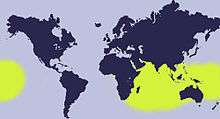Mauritia mauritiana
| Mauritia mauritiana | |
|---|---|
| | |
| Five views of a shell of Mauritia mauritiana | |
| Scientific classification | |
| Kingdom: | Animalia |
| Phylum: | Mollusca |
| Class: | Gastropoda |
| (unranked): | clade Caenogastropoda clade Hypsogastropoda |
| Superfamily: | Cypraeoidea |
| Family: | Cypraeidae |
| Genus: | Mauritia |
| Species: | M. mauritiana |
| Binomial name | |
| Mauritia mauritiana (Linnaeus, 1758) | |
| Synonyms[1] | |
| |
Mauritia mauritiana, common names the humpback cowry, chocolate cowry, mourning cowry and Mauritius cowry, is a species of tropical sea snail, a cowry, a marine gastropod mollusc in the family Cypraeidae, the cowries.[1]
Description
The shells of these quite common cowries reach on average 65–80 millimetres (2.6–3.1 in) in length, with a minimum size of 43 millimetres (1.7 in) and a maximum size of 130 millimetres (5.1 in). The dorsum surface of these smooth and shiny shells is generally dark brown, with distinct large yellowish or amber dots. The edges of the dorsum and the base are completely dark brown. The aperture is long and narrow, with several dark brown teeth and clear spacing. In the living cowries the mantle is completely black, without sensorial papillae.
Distribution

This is an Indo-Pacific species (see range map) occurring in the Indian Ocean along South-East Africa and in the western Pacific Ocean (western and northern Australia, Malaysia, Philippines and Hawaii).
Habitat
This species of cowry is normally restricted to exposed habitats such as wave-washed basalt cliffs or breakwaters. Mauritia mauritiana lives in tropical low intertidal water, usually under rocks or in rocky crevices at a minimum depth of about 2 metres (6 ft 7 in), but can be found up to 50 metres (160 ft).
References
- 1 2 WoRMS : Mauritia mauritiana; accessed : 20 October 2010
- Schilder, F. A. and Schilder, M. 1938. Prodrome of a monograph on living Cypraeidae. Proc. malac. Soc. Lond. 23: 119-231. page(s): 184
- Verdcourt, B. (1954). The cowries of the East African Coast (Kenya, Tanganyika, Zanzibar and Pemba). Journal of the East Africa Natural History Society 22(4) 96: 129-144, 17 pls.
- Burgess, C.M. (1970). The Living Cowries. AS Barnes and Co, Ltd. Cranbury, New Jersey
External links
- On-line articles with Cypraea mauritiana in the HAWAIIAN SHELL NEWS (1960-1994)
- Gastropods
- Underwater
| Wikimedia Commons has media related to Mauritia mauritiana. |